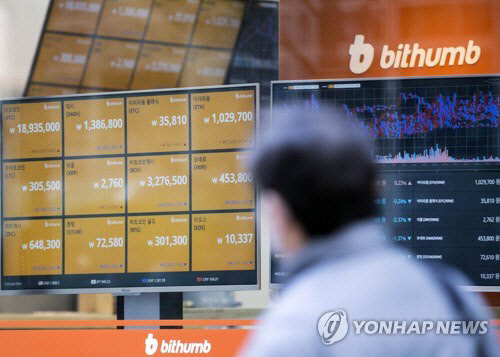Virtual money market to spring up…10 more markets to be open in the first half of the year
Kim Min Soo | minsu@ | 2018-01-05 10:25:16

[Photo] YONHAPNEWS
There are about 30 virtual exchange exchanges currently operating in Korea, and there are more than 10 additional openings in the first half of this year.
According to the virtual money industry on January 4, there are more than 30 virtual currency exchanges that are currently open to the domestic market. In addition to large exchanges such as Upbeat, Bitsum, Coin, and Cobit, small and medium-sized exchanges are hard to estimate, and accurate figures are difficult to estimate.
Meanwhile, in the first half of this year, there will be more than 10 such sites as Zynix, Nex Coin, Korea Virtual Exchange, and Comid.
The reason why virtual currency exchanges open up the door is to get huge virtual money commission income.
Virtual currency exchanges receive between 0.05 and 0.15% of commission as a commission. In the case of Upbeat and Bitsum, the largest exchanges in Korea, daily average commission income is estimated at W3.6bn and W2.6bn, respectively, and commission income is expected to double to some.
Meanwhile, it is difficult for the new exchange to expect profits of upbeat or bismuth, but if the investor is secured by the nature of the virtual money, the exchange can sit down and make a big profit at the same time.
As a result, there is concern about the damage caused by the virtual currency exchange and the bleeding competition.
In Particular, there is a concern about security. In fact, the virtual currency exchange Youbit has declared bankruptcy twice because of hacking twice, and even the big exchange, Bitsum, has repeatedly stopped the server.
The problem is that there is no regulation on the establishment of a new exchange. You need to pay KRW 40,000 to the municipality and declare it as a telecommunications distributor to establish a virtual currency exchange and anyone can be established without special requirements.
The Korea Block Chain Association, which is a member of the Virtual Currency Exchange, created self-regulatory regime and issued over KRW 2 billion in capital, information security system and information protection personnel and organization operation as the requirements of the KRX. It is literally self-regulated. There is no legal obligation to comply with the requirements and it is not clear how effective it will be.
Kim Jin-hwa, co-president of the Korea Block Chain Association, said, "There is a lot of concern that new exchanges can participate without preparation with the illusion that they will make profits by using passwords. "We have to compete for the exchange."
By Kim Min Soo minsu@
